European Commission chief Ursula von der Leyen has said that Brussels would put forward plans to ease rules and red tape criticised by farmers protesting across Europe.
The head of the bloc's executive arm said a proposal "to work on reducing these administrative burdens" would be presented at an upcoming meeting of EU ministers.
Angry farmers have protested in Belgium, France, Germany, Greece, the Netherlands, Poland and Romania in recent weeks.
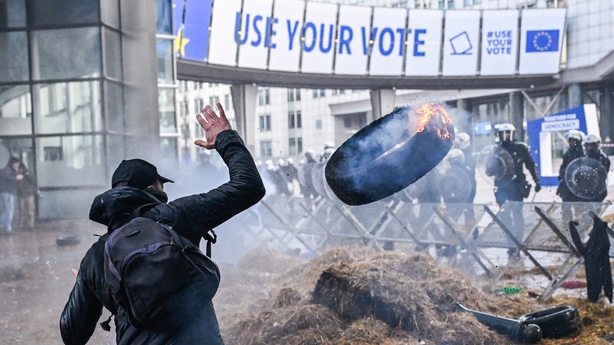
In Ireland, farmers and Irish Farmers' Association members are to hold a series of nationwide demonstrations this evening in solidarity with protesting EU farmers.
Protests will take place in every county following a decision by IFA National Council.
Their demands include lower taxes, cheaper electricity and fuel and stronger import controls. There is also fury over EU rules that they said make farming more difficult.
Ms Von der Leyen stressed Brussels was listening to farmers, especially since the bloc kicked off a "strategic dialogue" with representatives from Europe's agri-food sector.
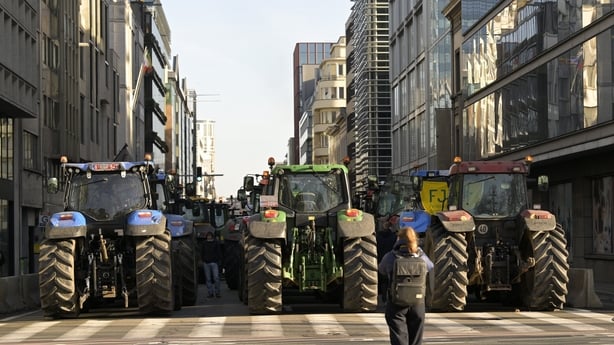
The initiative launched last week will continue for several weeks and seeks to find a consensus for Europe's farming future over the next five to 15 years.
"The aim is that together, we develop an idea, a vision and a roadmap, how to reach our common goals," Ms von der Leyen told a press conference after EU leaders met in Brussels to discuss aid to Ukraine.
The farmers' grievances include the EU's negotiations with the South American bloc, Mercosur, whose founding members are Argentina, Brazil, Paraguay and Uruguay.
They worry any EU-Mercosur trade agreement would further depress their produce prices and increase competition from exporting nations that are not bound by strict and costly EU environmental laws.
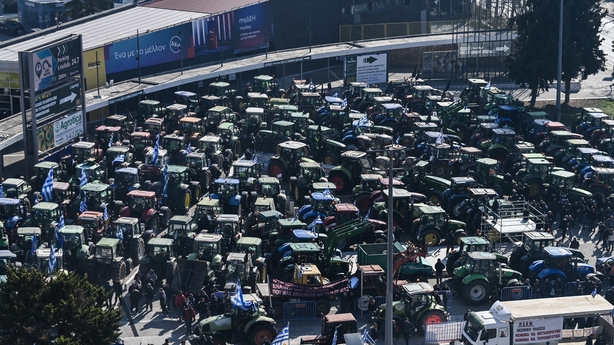
Ms Von der Leyen insisted the EU was aware of the concerns.
"Of course, we have to defend legitimate interests of farmers in our trade negotiations in particular, in ensuring a level playing field in terms of standards when we have trade agreements," she said.
French farmers' unions call for end to roadblock protests
It comes as France's leading farming unions have called to end nationwide roadblocks over pay, tax and regulation after securing promises of financial assistance and other help from the government.
"We have decided to suspend the roadblocks ... and move to a new form of mobilisation," Young Farmers (JA) president Arnaud Gaillot said at a press conference alongside Arnaud Rousseau, chief of the biggest rural union FNSEA, which is closely allied to the JA.
Farmers have been out in force for more than a week in protests triggered by an agricultural fuel duty hike, complaining their pay is squeezed, taxes are too high and regulations too onerous.
The easing in tensions followed promises of cash, eased regulations and protection against unfair competition by Prime Minister Gabriel Attal and his cabinet earlier today, the government's second wave of concessions in the space of a week.
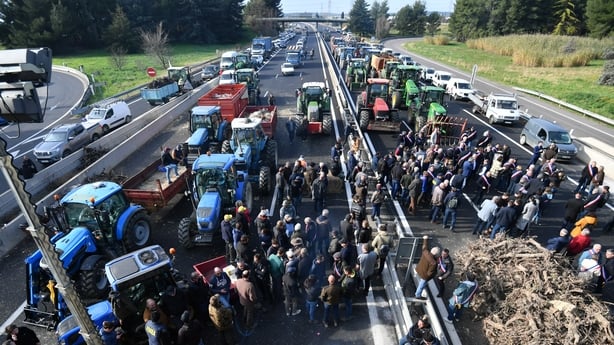
Together the FNSEA and JA account for the majority of French farmers' union memberships although it was not immediately clear if other groups would follow suit.
Mr Rousseau hailed "real progress" and said Mr Attal was "listening ... to try and understand what's at stake for us, inviting us in, talking, discussing and announcing emergency measures".
But the union chief said he would look to see "initial results" by the time the major Salon de l'Agriculture trade fair opens at the end of this month and for European measures by June.
"If these markers are not met, we won't hesitate to resume a general mobilisation," JA boss Mr Gaillot said.
Mr Rousseau reserved harsh criticism for "deafness" to farmers' woes at the European level.
He lambasted a "growing lack of understanding between a technocratic structure walled into its Brussels offices and the reality of what we experience on our farms".
'Back to the drawing board'
Mr Attal had earlier said he wanted to "better recognise the farming profession", "protect (farmers) against unfair competition" and "give value back to our food".
He offered up measures including an annual €150 million for livestock farmers and a ban on food imports treated with thiacloprid, a neonicotinoid pesticide already banned in France.
He also vowed to ensure a clear Europe-wide definition of lab-grown meat, a technology still in its infancy.
All major supermarkets will be audited for compliance with a law supposed to ensure fair prices for farmers' produce, Finance Minister Bruno Le Maire added at the same Paris press conference.
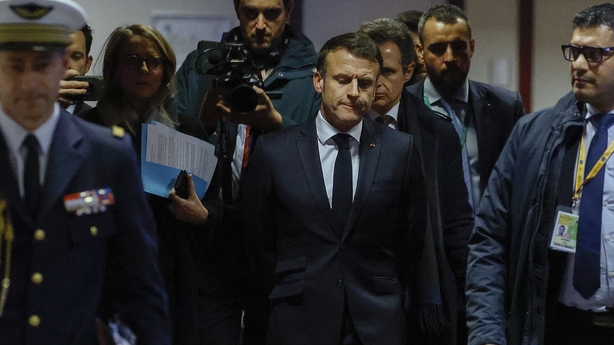
And France's national plan for reducing pesticide use "will be put back on the drawing board", Agriculture Minister Marc Fesneau said.
Today's offer to the farmers follows a first round of concessions last week, including the withdrawal of the resented fuel tax hike.
It also came as European leaders gathered in Brussels for a summit overshadowed by farmers' protests that have spread to multiple countries in recent weeks.
In a sign of the pressure on Paris, French President Emmanuel Macron held one-on-one talks with European Commission chief Ursula von der Leyen to discuss "the future of European agriculture" before the summit.
Trade deal battle
The EU has in recent days announced a temporary exemption from rules requiring some farmland to be left fallow.
The bloc could also limit imports of some Ukrainian agricultural products, on which tariffs were dropped following Russia's 2022 invasion.
France's government hailed the moves as a victory for its lobbying, but they were not enough to soothe the farmers' grievances.
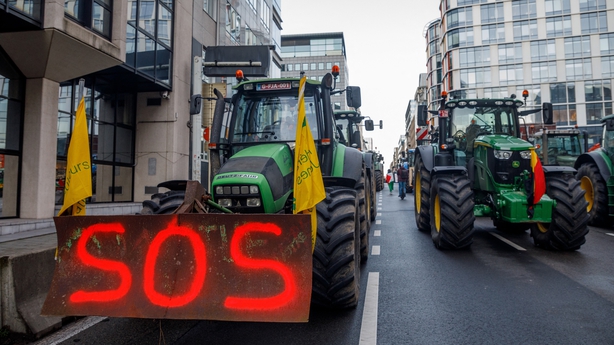
Many have demanded a full withdrawal from a long-negotiated free-trade deal with South American bloc Mercosur.
France has said it will not accept the agreement in its current form, although some other EU nations are determined to press ahead.
There were tense scenes at some farmers' roadblocks in France today, as demonstrators demanded passing truck drivers open up their cargoes for them to check the origin of produce.
Meanwhile a group of 79 farmers were released after being held in custody yesterday for an incursion into Rungis, a wholesale food hub serving the Paris region, with prosecutors saying they will investigate for property damage.

